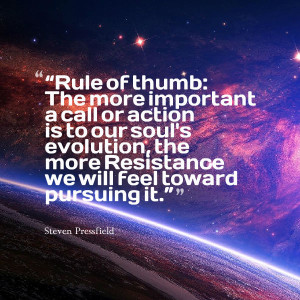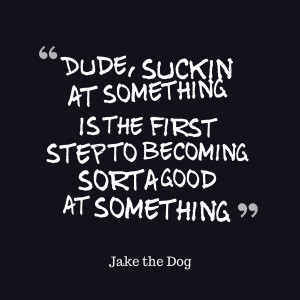Going through the core game design loop is an effective but challenging process. Each time through, you will expose your brilliant creation to the criticisms of others and find flaw after flaw that forces you to go back once again to refine your idea and sometimes to question the very brilliance of the idea itself. As you go through this cycle, it is easy to lose your way and get stuck or distracted by something that is less risky or difficult (e.g. watching television and eating ice cream). This article will help you break through those barriers and reframe the process as one of joyful discovery rather than one of inept failure. [note] pro tip: these are two sides of the same coin [/note]
Resistance

There is a force that builds up and tries to stop you from achieving your creative goals. As you get closer to these goals, the force gets stronger, trying to protect your fragile ego from exposing itself through your creations to others. Steven Pressfield dubbed this term Resistance in his wonderful book The War of Art.
Resistance comes in many clever forms:
“What if they don’t like it?”
“Maybe I should spend more time researching before I show this to anyone.”
“I need more resources before I can begin”
“I have too many responsibilities to keep working on this”
“There is too much competition”
“I’ll never be good enough”
Resistance knows your weaknesses and will attack viciously. The only way to beat resistance is to become a professional. Being a professional is not about being paid for your work. Being a professional is about showing up for your work every day, no matter what. Keep pushing through the iterations and you will see your design get better and better. Make progress everyday, no matter how small. Pay attention to when resistance is building, as this is a sign you are on the right track. When you feel resistance pause, take a few deep breaths and get back to work. Keep visible reminders of your goals to help inspire you when the going gets tough.
Take satisfaction each day that you beat resistance. Sometimes, resistance will beat you- don’t let one lost battle turn into a lost war. Dust yourself off and try again. One helpful tip is to keep a calendar somewhere visible and put an X on each day you work on your most important project. Try and get the biggest chain of Xs you can. If you break the chain, don’t worry- it’s a chance to start a new chain even longer than the last. The longest and strongest chain is built one link at a time. [note] There are also several great online tools for this. I use habitica to gamify and track my personal goals and habits. [/note]
Learning

Learning a new skill has 5 steps
1. Unconscious Incompetence
2. Conscious Incompetence
3. Conscious Competence
4. Unconscious Competence
5. Mastery
Each step has its own rewards and challenges, and each step provides a new opportunity to overcome Resistance. Lets take a look at each:
Unconscious Incompetence
In the unconscious incompetence stage, we don’t know what we don’t know. This is the terrain of the amateur, the critic, the dilettante. The beauty of unconscious ignorance is you have no idea what you are getting into, so it is easy to delude oneself that the path ahead is easy. Unconscious ignorance is a powerful force that gets people to do amazing things.
When I began to work on our digital card game Solforge, I had NO IDEA how hard a project it was going to be. Building and managing (multiple) engineering teams, while still designing the game and managing (rightfully) impatient kickstarter backers cost infinitely more in time, money, and sanity than I envisioned when we started. If I knew what I didn’t know, its possible I never would have started on the project, and yet I am proud of the game we created and the lessons we have learned- culminating in a full game release coming Soon(TM)
Conscious Incompetence
The real challenge begins as the learning process moves forward into conscious incompetence. Now, you begin to realize how much you have to learn and how little you know. This is a big part of what makes learning difficult. The feeling of being incompetent (and then revealing that incompetence to others) is scary and unpleasant. This is where Resistance thrives. Stay focused on taking small steps forward everyday [note] sometimes this will mean taking two steps backwards before you can take three forward [/note]. It can be helpful here to publicly commit to your goals early in the process. This puts the fear of looking bad back on your side. The fact that we had funded a Solforge kickstarter meant we had to get the game out one way or another, even when we otherwise might have quit.
Conscious Competence
Conscious Competence is when you finally begin to get good at what you are doing, but it still takes a lot of conscious effort and thought. I wrote down the steps of the Core Design Loop for people to follow who don’t know how to design games. If you learn those steps and follow them, you will get to this stage as a game designer. Conscious Competence is rewarding as you begin to see yourself improve, but you will still struggle with how long everything takes. The temptation here is to skip steps to try and move faster, but it is only through repetition and feedback that you can move to the next stage.
Unconscious Competence
This is where the money is. Your skills are now so ingrained that you don’t have to think about them. Your intuition becomes more free and the process becomes fun. You may regularly enter “flow” states where you lose your sense of time and personal identity while working. You have the ability to “get out of your own way.” There are still many things to learn, but there is more ease to the process and more progress each day. You are on the path to Mastery.
Mastery
Mastery is a journey, not a destination. As you reach Mastery, you will gradually increase your ability to be creative and intuitive in your work. You will see new possibilities and be able to break the rules in a way that enriches your work rather than sabotages it. Resistance does not disappear at this stage. Mastery is an ongoing process during which you continually seek to improve and will still become frustrated at times. You can, however, take strength in occasionally pausing and looking back at how far you have come before once again taking a deep breath and forging ahead with new challenges and lessons.
Becoming great at anything requires hard work and iteration. The iterative process of game design requires you to regularly show your very raw and flawed games to others, take criticism, and go back for more. If you are doing anything new and difficult, you will feel Resistance. You will want to stop. Trust the process and be grateful for the opportunity to learn. This is, after all, the heart of what makes gameplay engaging in the first place- the constant process of trying out new strategies and learning. Remember, designing games can be a wonderful game unto itself.


